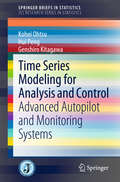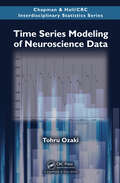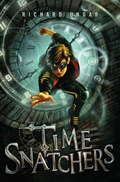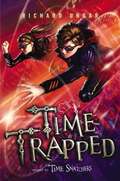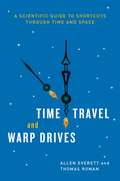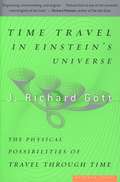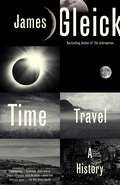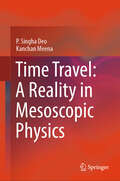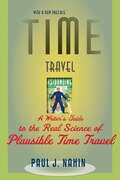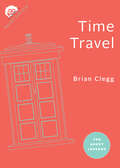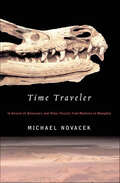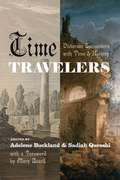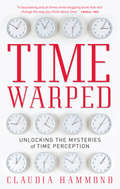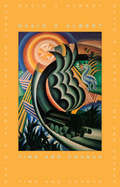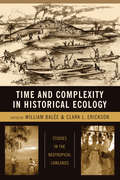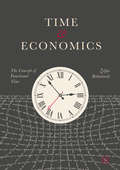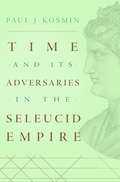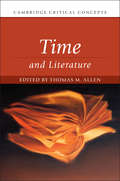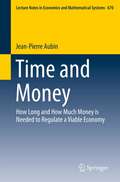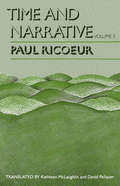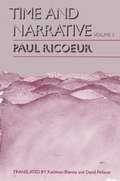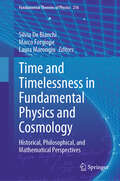- Table View
- List View
Time Series Modeling for Analysis and Control
by Genshiro Kitagawa Kohei Ohtsu Hui PengThis book presents multivariate time series methods for the analysis and optimal control of feedback systems. Although ships' autopilot systems are considered through the entire book, the methods set forth in this book can be applied to many other complicated, large, or noisy feedback control systems for which it is difficult to derive a model of the entire system based on theory in that subject area. The basic models used in this method are the multivariate autoregressive model with exogenous variables (ARX) model and the radial bases function net-type coefficients ARX model. The noise contribution analysis can then be performed through the estimated autoregressive (AR) model and various types of autopilot systems can be designed through the state-space representation of the models. The marine autopilot systems addressed in this book include optimal controllers for course-keeping motion, rolling reduction controllers with rudder motion, engine governor controllers, noise adaptive autopilots, route-tracking controllers by direct steering, and the reference course-setting approach. The methods presented here are exemplified with real data analysis and experiments on real ships. This book is highly recommended to readers who are interested in designing optimal or adaptive controllers not only of ships but also of any other complicated systems under noisy disturbance conditions.
Time Series Modeling of Neuroscience Data (Chapman & Hall/CRC Interdisciplinary Statistics)
by Tohru OzakiRecent advances in brain science measurement technology have given researchers access to very large-scale time series data such as EEG/MEG data (20 to 100 dimensional) and fMRI (140,000 dimensional) data. To analyze such massive data, efficient computational and statistical methods are required.Time Series Modeling of Neuroscience Data shows how to
Time Snatchers
by Richard UngarA thrilling middle-grade sci-fi Caleb's blinders are off. The small group of orphans who were also "adopted" by Uncle used to feel like family, but the competition to be the top time snatcher and the punishment for failure has gotten fierce. Time traveling to steal valuable objects can be a thrill, but with bully Frank trying to steal his snatches, his partner Abbie falling for Frank's slimy charms, and Uncle's plans to kidnap innocent kids to grow his business, Caleb starts thinking about getting out. But Uncle's reach extends to any country in any time period, and runaways get the harshest punishment of all. Caleb can steal just about anything from the past, but can he steal a family for the future? .
Time Trapped
by Richard UngarThe high-octane sequel to Time Snatchers. Caleb thought he'd escaped Uncle's clutches and could have a normal life in 1968, but no such luck. After being forcibly returned to Timeless Treasures and his old job of stealing valuable objects from the past, he learns that things have gotten even more sinister. Training the new kidnapped recruits doesn't seem very important to Frank, Uncle's evil lackey, even though a few of these kids have amazing theiving skills and genius for new technology. But then Caleb figures out it's because Frank doesn't plan on keeping them around very long - or keeping them alive. Stakes are high for all of the time snatchers. If only Caleb can convince the new ones to stop having fun with the technology and use it to save their own lives. .
Time Trapped
by Richard UngarThe high-octane sequel to Time Snatchers. Caleb thought he'd escaped Uncle's clutches and could have a normal life in 1968, but no such luck. After being forcibly returned to Timeless Treasures and his old job of stealing valuable objects from the past, he learns that things have gotten even more sinister. Training the new kidnapped recruits doesn't seem very important to Frank, Uncle's evil lackey, even though a few of these kids have amazing theiving skills and genius for new technology. But then Caleb figures out it's because Frank doesn't plan on keeping them around very long - or keeping them alive. Stakes are high for all of the time snatchers. If only Caleb can convince the new ones to stop having fun with the technology and use it to save their own lives.
Time Travel and Warp Drives: A Scientific Guide to Shortcuts through Time and Space
by Allen Everett Thomas RomanTo see video demonstrations of key concepts from the book, please visit this website: http://www.press.uchicago.edu/sites/timewarp/ Sci-fi makes it look so easy. Receive a distress call from Alpha Centauri? No problem: punch the warp drive and you're there in minutes. Facing a catastrophe that can't be averted? Just pop back in the timestream and stop it before it starts. But for those of us not lucky enough to live in a science-fictional universe, are these ideas merely flights of fancy—or could it really be possible to travel through time or take shortcuts between stars? Cutting-edge physics may not be able to answer those questions yet, but it does offer up some tantalizing possibilities. In Time Travel and Warp Drives, Allen Everett and Thomas A. Roman take readers on a clear, concise tour of our current understanding of the nature of time and space—and whether or not we might be able to bend them to our will. Using no math beyond high school algebra, the authors lay out an approachable explanation of Einstein's special relativity, then move through the fundamental differences between traveling forward and backward in time and the surprising theoretical connection between going back in time and traveling faster than the speed of light. They survey a variety of possible time machines and warp drives, including wormholes and warp bubbles, and, in a dizzyingly creative chapter, imagine the paradoxes that could plague a world where time travel was possible—killing your own grandfather is only one of them! Written with a light touch and an irrepressible love of the fun of sci-fi scenarios—but firmly rooted in the most up-to-date science, Time Travel and Warp Drives will be a delightful discovery for any science buff or armchair chrononaut.
Time Travel in Einstein's Universe: The Physical Possibilities of Travel Through Time
by J. Richard GottA Princeton astrophysicist explores whether journeying to the past or future is scientifically possible in this &“intriguing&” volume (Neil deGrasse Tyson). It was H. G. Wells who coined the term &“time machine&”—but the concept of time travel, both forward and backward, has always provoked fascination and yearning. It has mostly been dismissed as an impossibility in the world of physics; yet theories posited by Einstein, and advanced by scientists including Stephen Hawking and Kip Thorne, suggest that the phenomenon could actually occur. Building on these ideas, J. Richard Gott, a professor who has written on the subject for Scientific American, Time, and other publications, describes how travel to the future is not only possible but has already happened—and contemplates whether travel to the past is also conceivable. This look at the surprising facts behind the science fiction of time travel &“deserves the attention of anyone wanting wider intellectual horizons&” (Booklist). &“Impressively clear language. Practical tips for chrononauts on their options for travel and the contingencies to prepare for make everything sound bizarrely plausible. Gott clearly enjoys his subject and his excitement and humor are contagious; this book is a delight to read.&” —Publishers Weekly
Time Travel: A History
by James GleickFrom the acclaimed author of The Information and Chaos, here is a mind-bending exploration of time travel: its subversive origins, its evolution in literature and science, and its influence on our understanding of time itself. The story begins at the turn of the previous century, with the young H. G. Wells writing and rewriting the fantastic tale that became his first book and an international sensation: The Time Machine. It was an era when a host of forces was converging to transmute the human understanding of time, some philosophical and some technological: the electric telegraph, the steam railroad, the discovery of buried civilizations, and the perfection of clocks. James Gleick tracks the evolution of time travel as an idea that becomes part of contemporary culture--from Marcel Proust to Doctor Who, from Jorge Luis Borges to Woody Allen. He investigates the inevitable looping paradoxes and examines the porous boundary between pulp fiction and modern physics. Finally, he delves into a temporal shift that is unsettling our own moment: the instantaneous wired world, with its all-consuming present and vanishing future.(With a color frontispiece and black-and-white illustrations throughout) From the Hardcover edition.
Time Travel: A Reality in Mesoscopic Physics
by P. Singha Deo Kanchan MeenaThis book is aimed at postgraduate and Ph.D. students specializing in condensed matter physics, quantum mechanics, and the theory of relativity. It explores fundamental problems in physics that can be addressed in the mesoscopic regime. Some of the key topics covered include: a) The state of a tunneling particle under a barrier b) A local description of the state of a quantum particle c) Reality of time travel leading to reconciliation of the classical and quantum laws The book also sets the stage for developing an alternative description of quantum mechanics and how scattering phase shift can be used to probe local density of states. It highlights essential differences from traditional statistical mechanics and discusses the potential applications and future technologies stemming from breakthroughs in basic science, which will be of interest to researchers.
Time Travel: A Writer's Guide to the Real Science of Plausible Time Travel
by Paul J. NahinFrom H.G. Wells to Isaac Asimov to Ursula K. Le Guin, time travel has long been a favorite topic and plot device in tales of science fiction and fantasy. But as any true SF fan knows, astounding stories about traversing alternate universes and swimming the tides of time demand plausible science. That’s just what Paul J. Nahin’s guide provides.An engineer, physicist, and published science fiction writer, Nahin is uniquely qualified to explain the ins and outs of how to spin such complex theories as worm holes, singularity, and relativity into scientifically sound fiction. First published in 1997, this fast-paced book discusses the common and not-so-common time-travel devices science fiction writers have used over the years, assesses which would theoretically work and which would not, and provides scientific insight inventive authors can use to find their own way forward or backward in time. From hyperspace and faster-than-light travel to causal loops and the uncertainty principle and beyond, Nahin’s equation-free romp across time will help writers send their characters to the past or future in an entertaining, logical, and scientific way.If you ever wanted to set up the latest and greatest grandfather paradox—or just wanted to know if the time-bending events in the latest pulp you read could ever happen—then this book is for you.
Time Travel: Ten Short Lessons (Pocket Einstein Series)
by Brian CleggDuring times like these, who hasn't daydreamed about traveling forward or backward in time?In Time Travel: Ten Short Lessons, popular-science master Brian Clegg gives a grand tour of the essential lessons in this game-changing area of physics, from the imagination of novelists to current research.Einstein's special theory of relativity told us that time travel to the future was possible, and later his general theory of relativity showed us that loops in spacetime could exist, meaning that we might be able to bend time backward, too. But what are the practicalities of making time travel possible? What do we still need to know? How do we deal with paradoxical twists in time—and could quantum physics hold the answer? Packed full of easy-to-understand diagrams and fact boxes, these ten lessons cover all the basics, as well as the latest understanding and developments, to enlighten the nonscientist.About the series: The Pocket Einstein series is a collection of essential pocket-sized guides for anyone looking to understand a little more about some of the most important and fascinating areas of science in the twenty-first century. Broken down into ten simple lessons and written by leading experts in their field, discover the ten most important takeaways from those areas of science you've always wanted to know more about.
Time Traveler: In Search of Dinosaurs and Other Fossils from Montana to Mongolia
by Michael NovacekTrue stories of fossil-hunting adventures around the globe from “a world-class field scientist [and] a highly entertaining writer” (The American Scholar).Michael Novacek, a world-renowned paleontologist who has discovered important fossils on virtually every continent, is an authority on patterns of evolution and on the relationships among extinct and extant organisms. Time Traveler is his captivating account of how his boyhood enthusiasm for dinosaurs became a lifelong commitment to vanguard science. He takes us with him as he discovers fossils in his own backyard in Los Angeles, then goes looking for them in the high Andes, the black volcanic mountains of Yemen, and the incredibly rich fossil badlands of the Gobi Desert.Wherever Novacek goes, he searches for still-undiscovered evidence of what life was like on Earth millions of years ago. Along the way he has almost drowned, been stung by deadly scorpions, been held at gunpoint by a renegade army, and nearly choked in raging dust storms. Fieldwork is very demanding in a host of unusual, dramatic, sometimes hilarious ways, and Novacek writes of its alluring perils with affection and discernment. But in addition to being an enthralling adventure story, Time Traveler makes sense of many complex themes—about dinosaur evolution, continental drift, mass extinctions, new methods for understanding ancient environments, and the evolutionary secrets of DNA in fossil organisms.Includes photos and illustrations“A superb introduction to paleontology.” —Edward O. Wilson“An engaging book [that] gives us an excellent sense of the way paleontologists have arrived at their world-shaking conclusions.” —The New York Times Book Review“Novacek offers a spellbinding natural history of our planet, as well as the equally fascinating story of how he fell into the profession.” —Publishers Weekly
Time Travelers: Victorian Encounters with Time and History
by Adelene Buckland Sadiah QureshiThe Victorians, perhaps more than any Britons before them, were diggers and sifters of the past. Though they were not the first to be fascinated by history, the intensity and range of their preoccupations with the past were unprecedented and of lasting importance. The Victorians paved the way for our modern disciplines, discovered the primeval monsters we now call the dinosaurs, and built many of Britain’s most important national museums and galleries. To a large degree, they created the perceptual frameworks through which we continue to understand the past. Out of their discoveries, new histories emerged, giving rise to fresh debates, while seemingly well-known histories were thrown into confusion by novel tools and methods of scrutiny. If in the eighteenth century the study of the past had been the province of a handful of elites, new technologies and economic development in the nineteenth century meant that the past, in all its brilliant detail, was for the first time the property of the many, not the few. Time Travelers is a book about the myriad ways in which Victorians approached the past, offering a vivid picture of the Victorian world and its historical obsessions.
Time Warped: Unlocking the Mysteries of Time Perception
by Claudia HammondWe are obsessed with time. However hard we might try, it is almost impossible to spend even one day without the marker of a clock. But how much do we understand about time, and is it possible to retrain our brains and improve our relationship with it? Drawing on the latest research from the fields of psychology, neuroscience, and biology, and using original research on the way memory shapes our understanding of time, acclaimed writer and broadcaster Claudia Hammond delves into the mysteries of time perception. Along the way, she introduces us to an extraordinary array of colourful characters willing to go to great lengths in the interests of research, such as the French speleologist Michel, who spends two months in an ice cave in complete darkness. Time Warped shows us how to manage our time more efficiently, speed time up and slow it down at will, plan for the future with more accuracy, and, ultimately, use the warping of time to our own advantage.
Time Warped: Unlocking the Mysteries of Time Perception
by Claudia HammondAn award–winning BBC podcast host “has a steady touch . . . adding user-friendly charm” to “intriguing” research on the psychology of time perception (New York Times).Why does life seem to speed up as we get older? Why does the clock in your head move at a different speed from the one on the wall? Why is it almost impossible to go a whole day without checking your watch? Is it possible to retrain our brains and improve our relationship with it? In Time Warped, Claudia Hammond offers insight into how to manage our time more efficiently, how to speed time up and slow it down at will, how to plan for the future with more accuracy, and she teaches how to use the warping of time to our own benefit.“An ideal read for those looking for science-based theories of time perception without the scientific jargon. . . . Hammond demonstrates how life’s circumstances can make minutes seem an eternity and decades the blink of an eye.” —Library Journal“A well-researched meditation on how we see the future.” —Slate“This lively introduction to the psychology of time perception is an intriguing take on the fluidity of reality.” —Publishers Weekly“. . . a fascinating foray into the idea that our experience of time is actively created by our own minds and how these sensations of what neuroscientists and psychologists call “mind time” are created.” —Maria Popova, The Marginalian
Time and Chance
by David Z AlbertThis study is an attempt to get to the root of the tension between the best scientific pictures of the physical structure of the world and the everyday, empirical experience of it. It examines the problem of the direction of time - the notion that whatever can happen, can happen backwards.
Time and Chance
by David Z. ALBERTThis book is an attempt to get to the bottom of an acute and perennial tension between our best scientific pictures of the fundamental physical structure of the world and our everyday empirical experience of it. The trouble is about the direction of time. The situation (very briefly) is that it is a consequence of almost every one of those fundamental scientific pictures--and that it is at the same time radically at odds with our common sense--that whatever can happen can just as naturally happen backwards. Albert provides an unprecedentedly clear, lively, and systematic new account--in the context of a Newtonian-Mechanical picture of the world--of the ultimate origins of the statistical regularities we see around us, of the temporal irreversibility of the Second Law of Thermodynamics, of the asymmetries in our epistemic access to the past and the future, and of our conviction that by acting now we can affect the future but not the past. Then, in the final section of the book, he generalizes the Newtonian picture to the quantum-mechanical case and (most interestingly) suggests a very deep potential connection between the problem of the direction of time and the quantum-mechanical measurement problem. The book aims to be both an original contribution to the present scientific and philosophical understanding of these matters at the most advanced level, and something in the nature of an elementary textbook on the subject accessible to interested high-school students. Table of Contents: Preface 1. Time-Reversal Invariance 2. Thermodynamics 3. Statistical Mechanics 4. The Reversibility Objections and the Past-Hypothesis 5. The Scope of Thermodynamics 6. The Asymmetries of Knowledge and Intervention 7. Quantum Mechanics Appendix: Gedankenexperiments with Heat Engines Index Reviews of this book: The foundations of statistical mechanisms are often presented in physics textbooks in a rather obscure and confused way. By challenging common ways of thinking about this subject, Time and Chance can do quite a lot to improve this situation.--Jean Bricmont, ScienceAlbert is perfecting a style of foundational analysis that is uniquely his own...It has a surgical precision...and it is ruthless with pretensions. The foundations of thermodynamics is a topic that has accumulated a good deal of dead wood; this is a fire that will burn and burn.--Simon W. Saunders, Oxford UniversityAs usual with Albert's work, the exposition is brisk and to the point, and exceptionally clear...The book will be an extremely valuable contribution to the literature on the subject of philosophical issues in thermodynamics and statistical mechanics, a literature which has been thin on the ground but is now growing as it deserves to.--Lawrence Sklar, University of Michigan
Time and Complexity in Historical Ecology: Studies in the Neotropical Lowlands (Historical Ecology Series)
by William Balée Clark EricksonThis collection of studies by anthropologists, botanists, ecologists, and biologists is an important contribution to the emerging field of historical ecology. The book combines cutting-edge research with new perspectives to emphasize the close relationship between humans and their natural environment.Contributors examine how alterations in the natural world mirror human cultures, societies, and languages. Treating the landscape like a text, these researchers decipher patterns and meaning in the Ecuadorian Andes, Amazonia, the desert coast of Peru, and other regions in the neotropics. They show how local peoples have changed the landscape over time to fit their needs by managing and modifying species diversity, enhancing landscape heterogeneity, and controlling ecological disturbance. In turn, the environment itself becomes a form of architecture rich with historical and archaeological significance. Time and Complexity in Historical Ecology explores thousands of years of ecological history while also addressing important contemporary issues, such as biodiversity and genetic variation and change. Engagingly written and expertly researched, this book introduces and exemplifies a unique method for better understanding the link between humans and the biosphere.
Time and Economics: The Concept of Functional Time
by Željko RohatinskiThis book links the philosophical perception of time and Einstein’s theory of special relativity to economic processes, showing that the phenomena of time dilation and length contraction seen in physics can be identified within – and adapted to – an economic framework. The author expands on Marx’s model of reproduction with the additional variable of time, which is represented as a relative or functional category. In addition to allowing a more precise understanding of both static and dynamic relations between economic systems, this concept examines approaches to time proposed by Smith, Marshall and Keynes, and challenges the equilibrium and disequilibrium economic models. Rohatinski suggests that by understanding the differences in economic activity perceived across different time periods we are better able to influence that activity at micro- and macroeconomic levels.
Time and Its Adversaries in the Seleucid Empire
by Paul J. KosminUnder Seleucid rule, time no longer restarted with each new monarch. Instead, progressively numbered years, identical to the system we use today, became the measure of historical duration. Paul Kosmin shows how this invention of a new kind of time—and resistance to it—transformed the way we organize our thoughts about the past, present, and future.
Time and Literature (Cambridge Critical Concepts )
by Thomas M. AllenTime and Literature features twenty essays on topics from aesthetics and narratology to globalization and queer temporalities and showcases how time studies, often referred to as “the temporal turn,” cuts across and illuminates research in every field of literature, as well as interdisciplinary approaches drawing on history, philosophy, anthropology, and the natural sciences. Part I, “Origins,” addresses fundamental issues that can be traced back to the beginnings of literary criticism, while Part II, “Development,” shows how thinking about time has been crucial to various interpretive revolutions that have affected literary theory. Part III, “Application,” illustrates the centrality of temporal theorizing to literary criticism in a variety of contemporary approaches, from ecocriticism and new materialisms to media and archive studies. The first anthology to provide a synthesis of recent scholarship on the temporality of literary language from across different national and historical periods, Time and Literature will appeal to academic researchers and interested laypersons alike.
Time and Money: How Long and How Much Money is Needed to Regulate a Viable Economy
by Jean-Pierre AubinThis authored monograph presents an unconventional approach to an important topic in economic theory. The author is an expert in the field of viability theory and applies this theory to analyze how an economy should be dynamically endowed so that it is economically viable. Economic viability requires an assumption on the joint evolution of transactions, fluctuations of prices and units of numeraire goods: the sum of the "transactions values" and the "impact of price fluctuations" should be negative or equal to zero. The book presents a computation of the minimum endowment which restores economic viability and derives the dynamic laws that regulate both transactions and price fluctuations. The target audience primarily comprises open-minded and mathematically interested economists but the book may also be beneficial for graduate students.
Time and Narrative, Volume 2
by Paul RicoeurIn volume 1 of this three-volume work, Paul Ricoeur examined the relations between time and narrative in historical writing. Now, in volume 2, he examines these relations in fiction and theories of literature. Ricoeur treats the question of just how far the Aristotelian concept of "plot" in narrative fiction can be expanded and whether there is a point at which narrative fiction as a literary form not only blurs at the edges but ceases to exist at all. Though some semiotic theorists have proposed all fiction can be reduced to an atemporal structure, Ricoeur argues that fiction depends on the reader's understanding of narrative traditions, which do evolve but necessarily include a temporal dimension. He looks at how time is actually expressed in narrative fiction, particularly through use of tenses, point of view, and voice. He applies this approach to three books that are, in a sense, tales about time: Virgina Woolf's Mrs. Dalloway; Thomas Mann's Magic Mountain; and Marcel Proust's Remembrance of Things Past. "Ricoeur writes the best kind of philosophy—critical, economical, and clear."—Eugen Weber, New York Times Book Review "A major work of literary theory and criticism under the aegis of philosophical hermenutics. I believe that . . . it will come to have an impact greater than that of Gadamer's Truth and Method—a work it both supplements and transcends in its contribution to our understanding of the meaning of texts and their relationship to the world."—Robert Detweiler, Religion and Literature "One cannot fail to be impressed by Ricoeur's encyclopedic knowledge of the subject under consideration. . . . To students of rhetoric, the importance of Time and Narrative . . . is all too evident to require extensive elaboration."—Dilip Parameshwar Gaonkar, Quarterly Journal of Speech
Time and Narrative, Volume 3
by Paul RicoeurIn the first two volumes of this work, Paul Ricoeur examined the relations between time and narrative in historical writing, fiction, and theories of literature. This final volume, a comprehensive reexamination and synthesis of the ideas developed in volumes 1 and 2, stands as Ricoeur's most complete and satisfying presentation of his own philosophy. Ricoeur's aim here is to explicate as fully as possible the hypothesis that has governed his inquiry, namely, that the effort of thinking at work in every narrative configuration is completed in a refiguration of temporal experience. To this end, he sets himself the central task of determing how far a poetics of narrative can be said to resolve the "aporias"—the doubtful or problematic elements—of time. Chief among these aporias are the conflicts between the phenomenological sense of time (that experienced or lived by the individual) and the cosmological sense (that described by history and physics) on the one hand and the oneness or unitary nature of time on the other. In conclusion, Ricoeur reflects upon the inscrutability of time itself and attempts to discern the limits of his own examination of narrative discourse. "As in his previous works, Ricoeur labors as an imcomparable mediator of often estranged philosophical approaches, always in a manner that compromises neither rigor nor creativity."—Mark Kline Taylor, Christian Century "In the midst of two opposing contemporary options—either to flee into ever more precious readings . . . or to retreat into ever more safe readings . . . —Ricoeur's work offers an alternative option that is critical, wide-ranging, and conducive to new applications."—Mary Gerhart, Journal of Religion
Time and Timelessness in Fundamental Physics and Cosmology: Historical, Philosophical, and Mathematical Perspectives (Fundamental Theories of Physics #216)
by Silvia De Bianchi Marco Forgione Laura MarongiuThis book offers a clear account of timelessness together with the discussion of temporality in fundamental physics and cosmology. The multi-disciplinary approach to the problem of time and timelessness shows the remarkable difference between pre-relativistic debates and current developments. This book thoroughly discusses notions of timelessness and time emerging in the most recent literature on Quantum Gravity, String Theory and Cosmology. The contributions explore, among many aspects, the historical-philosophical roots of the notions of temporality and atemporality, the role of mathematics in defining time and temporality with respect to both order relations and causality, approaches to quantum gravity and cosmology that make use of quantum fluids and condensate to approximate space–time in general relativity, time and timelessness in black holes and the problem of cosmological time in bouncing cosmologies. The novelty of this volume lies in the interaction among scientists, philosophers, and historians in exploring the nature of time and timelessness and the origin of these concepts. The book represents a valuable toolkit for researchers and graduate students in physics, cosmology, philosophy and the history of those fields.
